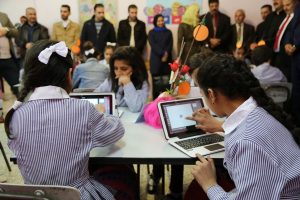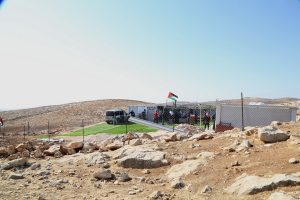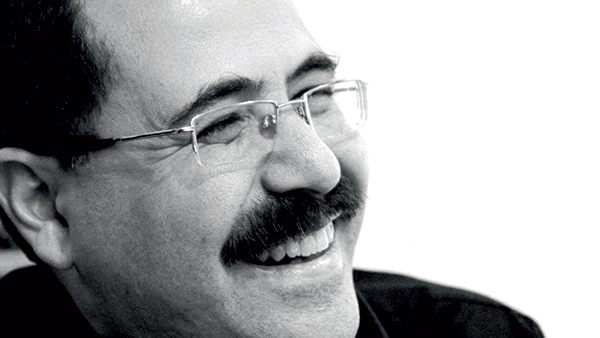This fall, an educational corps of 68,000 teachers and 1,300,000 students across the country resume their deployment as an ever-lively and productive beehive; renewing life, liveliness, activism, and action in homes, streets, schools, and all kinds of educational facilities; spreading optimism and hope, and stirring joy and delight equipped with a strong will and relentless determination.
We have designated this new school year as the “Year of Supporting Education in Jerusalem,” reflecting our loyalty to our eternal Capital, which possesses our hearts and enjoys the closest link to heaven. Thus we renew our commitment to remain loyal to the City, its land, sanctuaries, residents, schools, and community – sacrificing our lives and doing our utmost to protect its educational process and the future of its generations, and to save them from the clutches of Israelization and Judaization, so that Jerusalem remains the jewel in the crown and the main pillar of our lives.
Hence we will continue to provide financial support to the schools of Jerusalem, including private schools, and will continue to disburse the education allowances to those who work in the Holy City, provide its students with all schoolbooks free of charge, exempt them from school fees, and offer university scholarships to students from the Old City to strengthen their roots in the city and support their resilience.
Based on our belief in the need for continuing development and renovation in the education sector, we will take a bold decision at the beginning of this new school year by adopting a new system for graduation from the vocational disciplines that abolishes the final secondary school exam. This is envisaged to encourage parents and students to enroll in the vocational stream and will open new horizons ahead of them, allowing them to choose whether to enroll in the academic stream or in the vocational competence stream, where competences that are appraised nationally will be assessed (the “Project Evaluation” system) and graded in the same way the final secondary school exam Al Injaz is graded (the “Achievement” system).

Photo courtesy of MoEHE.
This step has been the outcome of an inclusive and comprehensive study and multiple consultations in the National Committee for Education Reform, the Final School Exam Committee, and the Educational Policy and Planning Committee in the Ministry, as well as the Education Committee. The aim is to support and elevate vocation and its pivotal role in sustainable development, support national economy, respond to the needs in the market, and advance production, following the example of several countries that have advanced industrially.
Therefore, we will continue to expand vocational and technical education as a priority and create a creative link between the outputs of the education system and sustainable development. The number of students in this stream will reach 5,000, with 1,700 in the 10th vocational grade. An increase in the number of schools will be accompanied by expansion in the types of programs and disciplines. This is the basis of the decision to endorse a new system, where students of the 12th vocational grade will graduate without taking a final exam, and to work on enhancing vocational and technical education curricula. Furthermore, we established 14 vocational units in academic schools, including two agricultural classes in Arraba town within Qabatya Education Department and Burin town within South Nablus Education Department as a starting point to create two agricultural schools.
As soon as it adopted the principle of development, the Ministry of Education and Higher Education has been applying it, as an approach and practice, in its pioneering educational plans, programs, and projects. On the ground, we started this approach by creating preschool classes in 60 schools in remote locations, bringing the number of government kindergarten and preschool classes to 204, as part of a plan to create a preschool class in every school in the country, which would reflect a significant shift in the field of early childhood education.
In terms of new curricula, schoolbooks for the 12th grade were completed, including the Christian Education schoolbook, which was included in the final secondary exam, Al Injaz (“Achievement”), for the first time in our history. New curricula written by Palestinian authors have been accomplished in record time, focusing on various aspects of science and knowledge within a national life-based context, leading the current generation to creativity and excellence, away from memorization and rote learning. Curricula have been developed for vocational and industrial schools and for informal education catering to individuals deprived from completing their education by certain circumstances, in order to promote the principle of quality education for all.

In terms of digitalizing education, we look forward to the day when we will say farewell to traditional education and schoolbags, which will be replaced by handbooks for teachers that allow for creative teaching based on diverse instruction methods. So far, we already have 54 schools applying smart learning and 14,000 students using tablets. We are working on expanding this groundbreaking project, which will culminate this year by applying the curricula of a new subject matter in programming, from grade 5 to grade 10 in all schools as an essential part of the educational process.
We will embark on establishing new Palestinian schools outside Palestine as we will soon open two schools in Turkey, followed by one in Malaysia and another in Germany, which will teach using the Palestinian curricula.
Development plans also include the expansion of energy production on the roofs of the schools, which is now implemented in 50 schools. We will continue working to include 500 schools in this program over a period of 3 years in cooperation with the Investment Fund. We will also expand the number of sustainable schools from 18 to 35 during this year and will start to apply the education acceleration system as per the provisions of the education law.
With regard to higher education, we will start to adopt the distance learning system (open electronic education), drawing on the experiences of many countries that now lead in this field. In addition, we will activate the new Higher Education Council, so that there will be a council for higher education and another for university presidents. We are also concerned with the issue of classifying universities in terms of the quality of instruction and in terms of disciplines as per the needs of the labor market and will continue to codify the different disciplines and merge those that can be merged. This is in addition to intensifying attention to scientific research.
Finally, we have great ambitions and hopes, and we will proceed in an informed way, guided by the interests of Palestine and its people, towards education development and renovation, step by step, and without delay or hesitation, because we have set out our goals and created our plans. Those who know the way will never get lost! And our way is being clearly marked every day in Al-Khan al-Ahmar, the Old Town of Hebron, Jerusalem, Gaza, and the entirety of Palestine, and we are decorating it with more schools of challenge designated for marginalized and affected areas and schools of determination made available in hospitals to serve our children who are receiving long-term medical treatments.
The World Bank reports that the education system in Palestine has become the fastest developing one in the Arab world. This is attributable to wise leadership, a bold government, a lively educational community, and a people who does not recognize submission and capitulation.
Congratulations to Palestine with its new school year, equipped with a renewed will.


